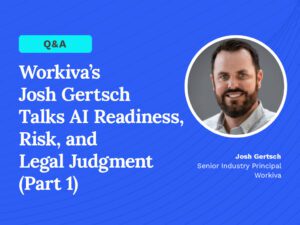Q&A With Noah Hanft of the International Institute for Conflict Prevention & Resolution (CPR)
December 4, 2014
After working for 13 years as General Counsel for MasterCard, Noah Hanft shifted to a new role with the International Institute for Conflict Prevention & Resolution (CPR), advocating for alternative approaches to traditional litigation. In a Q&A with Today’s General Counsel, Hanft explains how a dedicated litigator made the 180-degree switch to a mediation and arbitration evangelist, and how CPR’s system could revolutionize corporate disputes.
What was your professional background leading up to becoming General Counsel at MasterCard?
I started my career as an attorney with the Legal Aid Society in Brooklyn, New York. I tried a number of criminal cases in the late 70s and early 80s, and during my tenure at Legal Aid I studied for an LLM. I went to NYU Law in the evening, so I was trying cases, studying for a graduate degree, and devoting attention to a newborn. I remember typing my motions for a mistrial at night, studying for the LLM and giving my daughter a bottle at the same time.
After five years, I joined an intellectual property firm, Ladas & Parry, based in New York. I stayed with them for about three years and became intrigued by the idea of being in-house, and responded to an ad in the Law Journal in 1984 for a position with MasterCard. I was a staff attorney for several years, and got promoted to VP a couple of years after joining.
While you were working as a lawyer with MasterCard, what was your typical method of resolving disputes?
Well, it’s not surprising with my trial experience that I had a more traditional litigator type of approach. My first experience with a creative alternative to litigation was a patent case going back maybe 15 years ago. It was very successful, and later we used mediation in employment, IP and commercial disputes, and most importantly in our big antitrust cases. When I look back, every case we mediated was ultimately resolved and some of them before even the inception of litigation. I realized that not only was it so successful, I came to understand that the sooner we started the process, the better the outcome was, and it was the best way to minimize disruption and preserve business relationships. I truly became a believer. With each experience I realized that mediation is not the only way to resolve disputes, but it tends to be the best way, and there’s almost never any downside.
What was the case that made you into an advocate for ADR?
The case that is the most illustrative to me on the effectiveness of mediation was the recent settlement of the merchant fee class action. The case was between MasterCard, Visa, and almost all the card-issuing banks in the U.S. versus large retailers. Separately there was a class action with representatives from trade associations and retailers. It was a massive case, with hundreds of billions of dollars at play. These were big stakes, and we had two mediators working with us for several years to resolve what initially seemed like intractable issues. There was deep emotion and principles at issue, and many times it was said this case had to go to trial, that it was all about “the principle.” But at the end of the day we got ourselves to the point where we, with the help of our mediators, collectively found a resolution that had practical business components to it, and most importantly could resolve a bitter litigation.
That was the case that showed me that, if you start the process early and focus on trying to address the interests and needs of the parties as opposed to the simple focus on their legal rights, you can come up with the type of creative resolutions that you can’t get in court.
How Did You Get Involved With CPR?
After my experience I became intrigued by processes designed to address the needs of the parties, and was impressed with the effectiveness of mediation to resolve disputes. Originally I thought of leaving MasterCard to establish a mediation practice, but I decided that CPR would give me the chance to make more of an impact.
CPR was formed 35 years ago by corporate counsel, and the mission is to find better ways to resolve disputes. Early on, in the 80s, CPR created a pledge that was signed by more than 4,000 companies and 1,500 law firms, committing to seeking paths to resolution before litigating. It had a real impact and was one of the forerunners to mediation. Everything we’ve been involved in, including improving and streamlining the litigation process, is all part of the mission of CPR, which is essentially trying to find the very best ways businesses can resolve disputes.
CPR is a membership organization in the sense that many law firms and organizations join and they receive all the resources and best practices they need, including a dynamic ADR toolbox to provide for an end-to-end dispute resolution process.
What are the major benefits that companies stand to gain from utilizing ADR?
The main benefit comes when companies put in place a process where they’re able to embed a dispute prevention and resolution focus across the business. From the time the parties are thinking about a commercial agreement, how best to avoid or, if necessary, resolve disputes should be contemplated. To do so transactional lawyers and litigators need to be on the same page, and there needs to be an agreed upon approach to problems that may come up down the road. A step process refers to the notion of having a multi-step format for addressing, diffusing or resolving disputes. How you draft these provisions is critical because if you don’t draft in a knowledgeable and thoughtful way they can bite you back.
Assuming mediation doesn’t resolve a dispute, you need to have in place either a mandatory arbitration process, an optional arbitration process or be prepared to go straight into litigation. For those that prefer not to arbitrate, but want to take some control over the expense and time of litigation, CPR has come up with an alternative. Called “an economical litigation agreement” if parties cannot resolve a dispute through internal escalation and mediation, they can choose to engage in litigation with streamlined discovery and a jury trial waiver. So for those that still want to be able to resolve disputes in court, but want to do so in an efficient and economical manner, CPR has the answer.
What are the cons?
I do hear some say that arbitration has become too much like litigation, that it’s too costly, that discovery is almost as bad and expensive as litigation and arbitrators often split the baby, as opposed to ruling on the merits. My answer to that is pretty simple: use CPR. When we drafted our rules, we crafted them with a view toward addressing concerns about arbitration, so we created a streamlined 12-month process for a decision, we require our panel of arbitrators to be vetted by practitioners and users, and if the parties agree, we have created a right of appeal if the decision is not supported by the record or consistent with the law. By having the best panels of arbitrators and a cost effective and streamlined process we’ve addressed the cons.
Why should law firms join CPR?
We have many law firms as members, and the reason is straightforward: law firms want their clients to be satisfied with the services they perform. This is especially the case with law firms that are focused on repeat business and long-term relationships. With corporate customers embracing alternatives to litigation, more law firms want to develop expertise in dispute resolution and make sure their clients see that they are focused on getting the best, most economic and effective resolution.
Going forward, what are some initiatives CPR is working on?
We have international arbitration provisions coming very shortly, so companies can address arbitration with respect to cross-border matters, using CPR to administer those cases. We’re also working on online dispute resolution in conjunction with the UN Commission on International Trade Law to better enable global commerce. Through online dispute resolution you can facilitate a streamlined, cost-effective way to resolve cases that is often more productive than off-line. What makes CPR unique and valuable to corporations and law firms is that we’re an all-in-one provider for businesses. With CPR you can obtain everything you need in the ADR space, and at the same time, support a mission that helps businesses both domestically and globally engage in commerce as free as possible from the frustrations, cost and repercussions of litigation.
Read full article at:
Daily Updates
Sign up for our free daily newsletter for the latest news and business legal developments.




